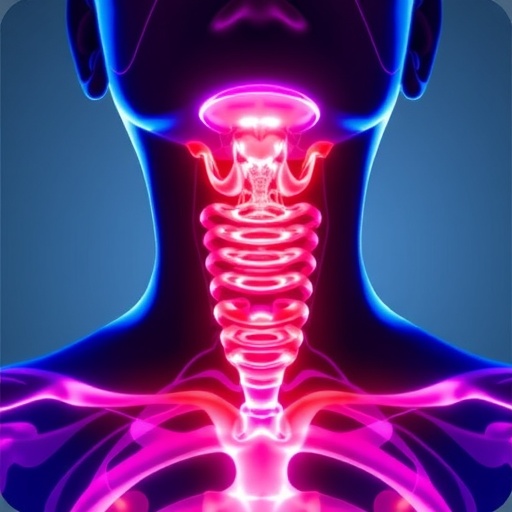In recent advancements in the field of medical imaging and artificial intelligence, a groundbreaking study has emerged focusing on the surgical management of Papillary Thyroid Microcarcinoma (PTMC). A team of researchers, led by E. He and including notable contributors such as Y. Wang and X. Wang, has employed a multiclass deep neural network to analyze preoperative ultrasound features, ultimately providing tailored recommendations for surgical approaches based on their findings. The study highlights the potential of integrating advanced machine learning techniques into clinical decision-making, thereby improving patient outcomes in the management of PTMC.
Papillary Thyroid Microcarcinoma, a subtype of thyroid cancer, presents unique challenges in its treatment due to its often indolent behavior. As many cases remain asymptomatic, the decision regarding the necessity of surgery often leads to significant debates among clinicians. The research conducted by He et al. has introduced a systematic method to utilize preoperative ultrasound imaging—a standard procedure in the assessment of thyroid nodules. By leveraging the capabilities of deep learning, the researchers aimed to refine the surgical decision-making process.
The innovative approach taken by the team involved training a multiclass deep neural network on a comprehensive dataset containing multiple ultrasound features. This dataset included variations in nodule size, echogenicity, microcalcifications, and other critical sonographic characteristics that can indicate the malignancy potential of thyroid nodules. The neural network’s design allows it to analyze these features and categorize them with unprecedented accuracy, potentially reshaping the landscape of how PTMC is diagnosed and treated.
One of the key findings from the study was the neural network’s remarkable ability to predict outcomes based on ultrasound features alone. This predictive power holds significant implications for the surgical approach, allowing clinicians to personalize management strategies for patients with PTMC. By distinguishing between indolent and aggressive tumor variants, the deep learning model serves as a vital tool in minimizing unnecessary surgeries, which can help reduce the physical and psychological burden on patients.
Moreover, the researchers ensured that their model not only provided accurate predictions but also incorporated an explainability component. Understanding the rationale behind the model’s recommendations can assist clinicians in making informed decisions and justifying their surgical strategies to patients. This aspect of transparency is crucial as the integration of artificial intelligence into healthcare continues to rise, demanding accountability in the tools that drive clinical decisions.
The implications of this study extend beyond mere surgical recommendations; they signify a deeper potential for integrating artificial intelligence into everyday medical practice. The ability to analyze vast amounts of data rapidly could pave the way for developing predictive models for various medical conditions. The methodologies applied in this research can inspire future studies targeting different forms of cancer or other diseases requiring nuanced decision-making frameworks.
As healthcare systems worldwide increasingly face the challenges of managing patient flow and reducing costs, the implementation of technologies such as deep neural networks could transform the operational landscape. By facilitating tailored treatment plans and enhancing the accuracy of diagnoses, such innovations may lead to more effective resource allocation, allowing healthcare providers to focus on delivering high-quality care.
Despite the promising results observed in this research, it is important to recognize the ongoing need for rigorous validation studies in diverse clinical settings. The generalizability of deep learning models is a topic of ongoing investigation, as variations in patient populations, imaging protocols, and clinical environments can influence model performance. Therefore, real-world application and continuous refinement of such technologies will be necessary to ensure optimal outcomes across varying scenarios.
The relationship between technological advancement and patient care is an evolving narrative. As machine learning and artificial intelligence continue to permeate the medical field, discussions surrounding ethical considerations, data privacy, and the role of human judgment in clinical practice will become increasingly pertinent. It is crucial for the medical community to engage in these discussions to ensure the responsible utilization of such tools in enhancing patient care.
Ultimately, the research led by He et al. represents a significant leap in the interdisciplinary collaboration between medicine and technology. As we look to the future, the potential for further developments in machine learning applications in healthcare illustrates a dynamic shift towards data-driven decision-making. The convergence of ultrasound imaging and deep neural networks not only provides immediate benefits for PTMC management but may also lead to broader innovations applicable to various medical domains.
In conclusion, the study’s insights into utilizing a multiclass deep neural network for recommending surgical approaches based on preoperative ultrasound features underscores the transformative potential of artificial intelligence in the field of medicine. From improving diagnostic accuracy to personalizing treatment strategies, the implications are profound. As researchers continue to explore the integration of these technologies, the future of surgical oncology—with its promise of enhanced precision—appears increasingly bright.
Subject of Research: Surgical approach recommendations for Papillary Thyroid Microcarcinoma based on preoperative ultrasound features using deep learning.
Article Title: Recommendation of a Surgical Approach for Papillary Thyroid Microcarcinoma Based on Preoperative Ultrasound Features Using a Multiclass Deep Neural Network.
Article References: He, E., Wang, Y., Wang, X. et al. Recommendation of a Surgical Approach for Papillary Thyroid Microcarcinoma Based on Preoperative Ultrasound Features Using a Multiclass Deep Neural Network. J. Med. Biol. Eng. 45, 378–384 (2025). https://doi.org/10.1007/s40846-025-00957-0
Image Credits: AI Generated
DOI: https://doi.org/10.1007/s40846-025-00957-0
Keywords: Papillary Thyroid Microcarcinoma, Deep Neural Network, Preoperative Ultrasound, Surgical Recommendations, Machine Learning.




